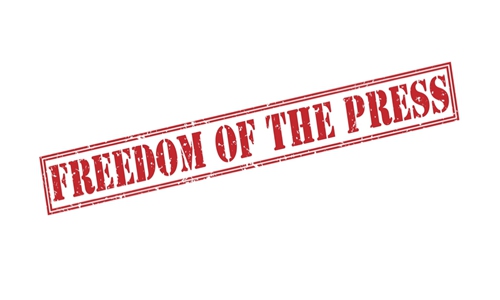
Photo: IC
Since US President Donald Trump assumed office, Washington has impaired relations with Beijing by repeatedly stirring up trouble. And now its latest move involves suppressing China's media outlets.
After working as a Chinese correspondent in the US for over six years, I understand what "freedom of the press" means that Washington likes to advocate.
Foreign reporters covering the US are regulated by the Foreign Press Centers (FPC) with the US Department of State. It appears the US government is overtly or covertly on guard against Chinese news agencies.
In May 2012, for the annual NATO summit in Chicago, Illinois, a colleague was sent to cover the event. After registering without exception, the day before the summit, when my colleague arrived at the venue, he was refused a press pass despite having valid credentials. Unable to enter the venue and report in real-time, he was forced to compile stories culled from foreign media outlets.
After the event ended, we negotiated with the FPC on this case. Although US officials expressed regret over our encounter and understood our dissatisfaction, they claimed the move had nothing to do with the State Department and was carried out by the local security department. The exact reasons were never provided.
In a separate incident, we were on a reporting tour at a national laboratory organized by the US government. Beforehand, we filled out multiple forms and underwent a government examination. The visit was canceled at the last minute after we arrived in the city where the laboratory was located.
To attend press conferences at the White House and the Pentagon, foreign reporters need a special permit other than the one issued by the State Department. Known as a "hard pass," it is difficult to obtain.
Foreign reporters are eligible for White House "hard pass" after they cover the White House for a certain period of time, six months if I remember correctly and as government officials have claimed. Some Chinese correspondents reported on the White House for over six months and yet received nothing. Only a limited number of Chinese reporters received the credential. And even with the permit, the chances for Chinese journalists to ask questions at press conferences are small.
Many question-and-answer sessions during press conferences are pre-arranged. It is not the case that reporters would be called as long as they kept raising their hands. Western mainstream media outlets occupy fixed front-row seats. It was clear how they had been able to maintain greater say among international public opinion on such occasions.
When former US President Barack Obama was in office, my colleagues and I were never denied visas. However, things have changed since then.
Visas of 21 Chinese journalists in the US have been rejected since 2018, said China's Foreign Ministry spokesperson Hua Chunying.
And not only reporters but Chinese students, scholars, and scientists have been denied entry. The incidents are too numerous to mention.
China recently revoked press credential of three journalists with the Wall Street Journal (WSJ) for a racist headline the newspaper published and its refusal to apologize. It's for a specific incident. Yet the US has targeted 60 employees at five separate Chinese media outlets, which reveals its intensified efforts to sour bilateral relations.
The article was compiled by Global Times reporter Yan Yunming based on an interview with a former Chinese correspondent in Washington who wished to remain anonymous. opinion@globaltimes.com.cn
